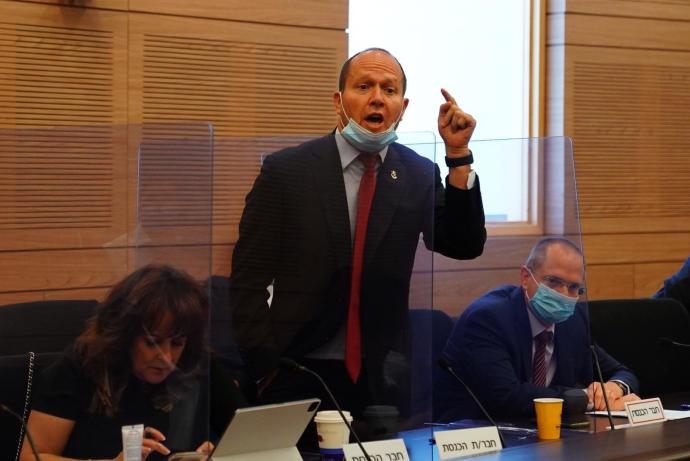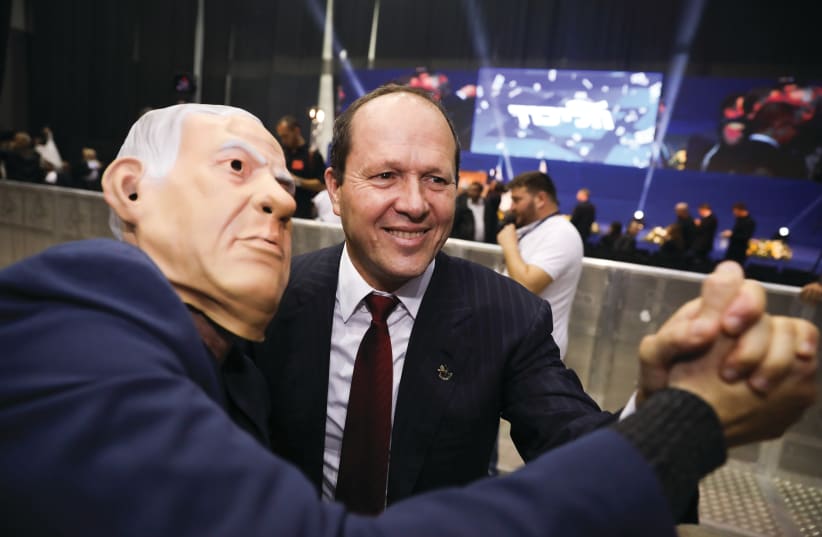It’s tough being in the opposition when good things happen.
Why? While you might be happy that something positive is occurring, you can’t dare give voice to that happiness because that would mean that the government, which you vehemently oppose, is doing something right.
The result is that even when something good happens – such as the Negev Summit organized by Foreign Minister Yair Lapid that brought the foreign ministers of Bahrain, Egypt, Morocco and the United Arab Emirates to Sde Boker along with US Secretary of State Antony Blinken – you have to find something to complain about, something to pour some cold water on.
Likud MK Nir Barkat gave a live demonstration of this phenomenon during a KAN Bet interview on Tuesday.
Asked about the summit a day earlier, Barkat – echoing the sour grapes of others on the Right that was on ample display over the last few days on social media – said he was disappointed.


“I had the expectation – and am pleased about any cooperation against the Iranians – I thought, like most of the Israeli public, that we were going to welcome some kind of organization against the Iranians,” said Barkat, a man with prime ministerial aspirations.
“But instead, what did we get? Pressure on the Palestinian issue, perhaps to again open up the [US] consulate [in Jerusalem]; again, that we’re guilty; again, pressure on Israel. I expected... the organization of an alliance of everyone against the Iranians.”
Really? Is that what the country, the region and the world saw coming out of Sde Boker? Pressure on Israel over the Palestinian issue?
Was that truly the predominant message? Not the strong condemnations by each of the foreign ministers of the horrific attack in Hadera (though the Egyptian foreign minister was more general in his condemnation than his colleagues)? Not a desire to change the entire narrative in the Mideast, from fighting against each other to working with one another?
Not – and this is probably the most important thing – taking the relationship with Israel out of the bottom drawer and putting it squarely on top of the desk for all to see, including for those at home in Morocco, the UAE, Bahrain and even Egypt?
One of the problems with Israel’s relationship with the Arab world until now has been that it has taken place between leaders and governments, but is largely hidden from public view.
The novelty in the relations with the UAE, Bahrain and Morocco forged in 2020 is that the leaders of those countries want their people to see the ties, and the benefits of those ties, so that the attitudes of their public toward Israel will change.
As Morocco’s Foreign Minister Nasser Bourita said, “I think we are here today because we genuinely, sincerely and deeply believe in peace – not that kind of passive peace where we turn our backs to each other and peacefully ignore each other, but rather we believe in a thorough, fruitful, paradigm-shaping and value-creating peace... We are here to create and to strengthen a positive dynamic, to create a different narrative about the relations between our people.”
Or, as UAE Foreign Minister Abdullah bin Zayed put it, “Forty-three years ago, when Egypt and Israel made peace, unfortunately, we lost those 43 years of knowing each other better, of working together and of changing the narrative that many generations of Israelis and Arabs have been living.”
He said this was the first time that he and his colleagues from Morocco and Bahrain were in Israel.
“So if we are curious sometimes and we want to know things and learn, it’s because although Israel has been part of this region for a very long time, we’ve not known each other. So it’s time to catch up, to build on a stronger relationship.”
But none of that made it into what Barkat took away from the summit. His takeaway was only that Israel was being pressured about the Palestinians.
And how did he come to that conclusion? Evidently, because Blinken and the foreign ministers from Bahrain, Egypt and Morocco all referenced the issue in their brief public comments at the end of the summit.
“We have to be clear that these regional peace agreements are not a substitute for progress between Palestinians and Israelis,” said Blinken. And the ministers from Bahrain, Egypt and Morocco all spoke of the need for a resolution to the conflict resulting in a state for the Palestinians, with Sameh Shoukri from Egypt and Bourita from Morocco calling for that state to be within the 1967 lines with east Jerusalem as its capital. The UAE’s minister made no mention of the Palestinians in his comments.
But referencing it does not amount to ganging up on Israel over the issue.
It was to be expected that the Arab ministers, whose words were broadcast back home and in other capitals around the region, would not stand within close proximity of the burial place of Israel’s founding father, David Ben-Gurion, and not address this issue. Otherwise, they would be accused of normalizing ties with the Jewish state while ignoring their Palestinian brethren.
Were they just paying lip service to the Palestinian cause? Possibly, though they surely believe that a Palestinian state should be established along the 1967 lines with east Jerusalem as its capital. But just saying it does not mean they are ganging up or pressuring Israel, nor should it overshadow the trailblazing nature of the Negev Summit.
Bahrain, Egypt, Morocco, the UAE and even the US are not going to agree with Israel regarding the Palestinians. But that’s okay. Countries can disagree. The landmark nature of the Abraham Accords was the realization by the Arab countries involved that they can disagree with Israel about the Palestinians, and still have a constructive and productive relationship with Jerusalem.
Relations between countries, like relations between people, need not be all or nothing, need not be “either you see things my way and act as I expect, or we don’t talk or work together and I cancel you out.” That, for the most part, was the paradigm that existed before the signing of the Abraham Accords. Those accords broke that mold.
It is possible to disagree on the Palestinian issue and still normalize relations. One is not mutually exclusive of the other.
Perhaps, as a result of normalization of these relations and finding common ground on a slew of other issues, it may create a dynamic that will render it easier to eventually find accommodation with the Palestinians as well.
But to look at the Negev Summit, as Barkat did, and see only pressure over the Palestinians is to badly miss the bigger picture.
It is as if looking at Vincent van Gogh’s The Starry Night painting, and instead of seeing and appreciating its swirling beauty, focusing on a few houses painted in the foreground – as if that is what the masterpiece is all about.
